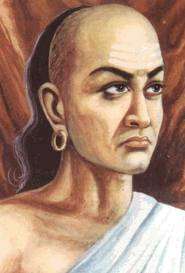
Chanakya (also known as Kautilya or Vishnu Gupta (c. 370–283 BC) was an Indian teacher, philosopher, and royal adviser. He was initially a professor of economics and political science at the ancient Takshashila University in Takshashila (in present day Pakistan). He managed the first Maurya emperor Chandragupta's rise to power at a young age. He played an important role in the establishment of the Maurya Empire, which was the first empire in archaeologically recorded history to rule most of the Indian subcontinent. Chanakya served as the chief advisor to both Chandragupta and his son Bindusara (whose son was Emperor Ashoka.) Chanakya is credited with authoring two treatises said to be the first of its genre in the world – the Arthasastra (Economics), the ancient Indian political treatise; the Nitishastra, the Chanakya Niti, a treatise on the ideal way of life and his policies. His works predate Niccolò Machiavelli's by about 1,800 years. He is compared to Aristotle, the great Greek philosopher who taught Alexander as both had identical views on the republican forms of governance. His works which were lost towards the end of the Gupta dynasty could be discovered only in 1915.
Quotes
Arthashastra
- Whoever imposes severe punishment becomes repulsive to the people; while he who awards mild punishment becomes contemptible. But whoever imposes punishment as deserved becomes respectable. For punishment when awarded with due consideration, makes the people devoted to righteousness and to works productive of wealth and enjoyment; while punishment, when ill-awarded under the influence of greed and anger or owing to ignorance, excites fury even among hermits and ascetics dwelling in forests, not to speak of householders.
- Book I : "Concerning Discipline" Chapter 4 "Determination of the Place of Varta and of Dandaniti"
- If a king is energetic, his subjects will be equally energetic. If he is reckless, they will not only be reckless likewise, but also eat into his works. Besides, a reckless king will easily fall into the hands of his enemies. Hence the king shall ever be wakeful.
- Book I : "Concerning Discipline" Chapter 19 "The Duties of a King"
- All urgent calls he shall hear at once, but never put off; for when postponed, they will prove too hard or impossible to accomplish.
- Book I : "Concerning Discipline" Chapter 19
- The king who is situated anywhere immediately on the circumference of the conqueror's territory is termed the enemy.
The king who is likewise situated close to the enemy, but separated from the conqueror only by the enemy, is termed the friend (of the conqueror).- Book VI, "The Source of Sovereign States"
- The area extending from the Himalayas in the north to the sea and a thousand yojanas wide from east to west is the area of operation of the King-Emperor.
- Chakravarti-kshetra as described by Kautilya: Arthashastra 9:1:17 (tr. L.N. Rangarajan), quoted from Elst, Koenraad (2001). Decolonizing the Hindu mind: Ideological development of Hindu revivalism. New Delhi: Rupa. p.457
Maxims of Chanakya
- सुखस्य मुलं धर्मः
- Righteousness is the root of happiness.
- न कृतार्थानां मारणाभयम्
- The contented have no fear of death.
- नास्ति खलस्य मित्रम्
- The wicked have no friends.
About Kautilya's Arthashastra
- [Arvind] Sharma speculates that a reason for India's downfall was the eclipse of the category of Chakravarti as mentionned in the Arthashastra. A Chakravarti's domain was from ocean to ocean; he was above all the other kings who were local. He feels that the Arthashastra at some point ceased to be taught for learning realpolitik. There appears to have been an attack on it by liberal passivism. It is ironic, he says, that during British rule the Arthashastra text had disappeared until a copy suddenly surfaced with a farmer in Kerala in the early twentieth century... Sharma recommends introducing the study of Arthashastra in all schools in all languages.
- Rajiv Malhotra, (2019). Battle for Sanskrit: Is Sanskrit Political or Sacred? Oppressive or Liberating? Dead or Alive?. HarperCollins Publishers.